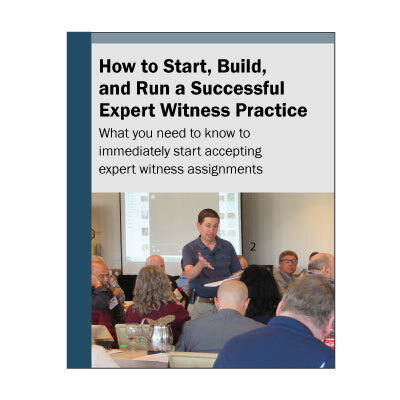The requirements to be an expert witness can be broken down into two categories – the legal requirements for being an expert witness and perhaps more importantly, the practical requirements for being an expert witness.
Legal Requirements for providing Expert Witness Services
The legal requirements for being an expert witness are fairly minimal. According to Federal Rule of Evidence 702, expert witnesses must have “knowledge, skill, experience, training, or education” which will “help the trier of fact to understand the evidence or to determine a fact in issue.” This is a very broad standard. Under this standard most adults could probably be qualified as an expert witness on something. Two other legal requirements are somewhat common and will vary depending on jurisdiction. First, some states require physicians testifying as an expert witness in a medical malpractice case to be of the same specialty as the defendant. Some states may also require an expert witness testifying in that state to have a license in that state or face charges of practicing without a license.
Practical Requirements for providing Expert Witness Services
The practical requirements for serving as an expert witness are far more extensive. Some of the practical expert witness requirements include:
- Demand for your area(s) of expertise. The areas(s) of your expertise need to be ones that litigators are looking for or you will get no work.
- The ability to always meet and beat deadlines. Litigation is deadline driven.
- A competitive spirit and commitment to excellence. Expert witness services should not be provided half-heartedly.
- A lack of skeletons in your closet such as criminal convictions, license revocations, controversial past writings, doing poorly or being disqualified on a past expert witness assignment, etc.
- Having a schedule that is somewhat flexible to allow for depositions and trial appearances.
- Having enough free time to be able to turn assignments on deadline – this may necessitate working nights and weekends.
- Having an employer who allows you to serve as an expert witness.
- Being thick skinned. Expert witnessing is not for the thin skinned. The opposing side will make it their mission to challenge your work and credentials and paint you as unqualified, sloppy, less than honest, a hired gun, etc.
- Communication skills. Expert witnesses lacking in verbal and written communication skills are useless.
- A CV so that retaining counsel can review your qualifications.
- A fee schedule, or better yet, an expert witness contract.
- Having excellent organizational, investigative, and research skills.
If you are interested in becoming an expert witness, we suggest you start out with the Online Streaming Course; How to Start, Build and Run a Successful Expert Witness Practice
If you are interested in Expert Witness Referrals, consider joining our SEAK Expert Witness Directory

